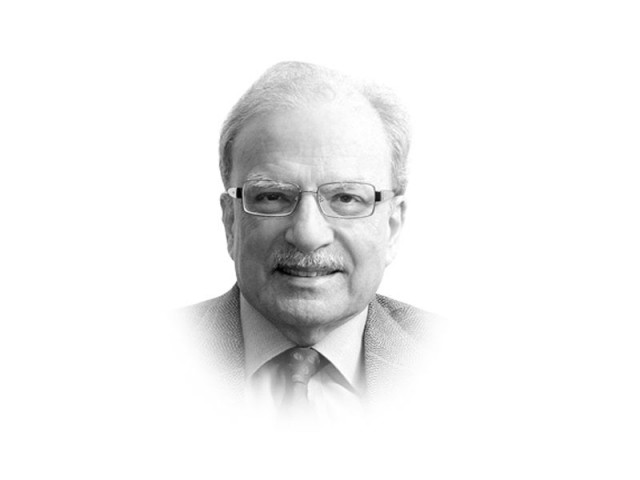Xi Jinping acquires more power
Xi Jinping can serve in the position he currently occupies until he dies

The writer is a former caretaker finance minister and served as vice-president at the World Bank
Those who pursued other disciplines also moved in with their own positive predictions. Several political economists used equations and regression analyses to conclude that as societies develop economically they also modernise their political systems. ‘Modernisation’ was defined as the adoption of liberal democracy. Some quantitative analyses based on historical data, came up with $6,000 per capita income as the point at which old governing systems were dispensed with in favour of representative forms of government.
But the expected has happened. The Communist Party of China has decided on an important change to its constitution. It has removed the restriction that the president can serve for only two consecutive terms. This means that Xi Jinping can serve in the position he currently occupies until he dies. He will be in office at least until 2028, completing three terms. He may stay beyond that date. This is a momentous change. In order to understand the significance of this change we need to go briefly into the history of governance in China. That history seems to suggest that in at least one respect the Chinese were moving at what was seen generally as the right direction. They had put in place a system that was aimed at preventing the rise of the Maoist type of authoritarian rule. The two-term limit was imposed by Deng Xiaoping, China’s Supreme Leader, who after the death of Mao Zedong, served as the Communist Party’s secretary general. He chose not to become the country’s president, appointing political non-entities to the job.
Deng had learnt from bitter experience that too much power concentrated in one pair of hands leads to authoritarianism attendant by uncertainty, unpredictably and whimsicality. Mao was able to exercise that power because of the godlike status he enjoyed in the country. He was the founder not only of the Chinese Communist State but had also brought about social and economic change that laid the ground for modern-day China.
He brought universal literacy and universal healthcare to the country and freed women from slavery-like conditions. But he made several costly mistakes. While working under Mao, Deng Xiaoping attempted to apply some constraints on the leader. Mao was the author of the disastrous ‘Great Leap Forward’ move inaugurated in 1958 and of the Cultural Revolution launched seven years later in 1965.
The first was meant to defy the laws and logic of economics. State action could quicken — double, triple, quadruple — the rate of economic growth by forcing people to move out of low productivity agriculture into high productivity industry. Establishment of backyard steel furnaces was the most egregious part of this move. The second was the founding of rural communes in which the state took ownership of all land and moved the owners of the land and its cultivators into communal living. The result was a disaster.
China suffered one of its worst famines in which tens of millions of people died of hunger. The Cultural Revolution came after Mao felt that his people were losing the revolutionary fervour and zeal that had resulted in the establishment of the Communist State in 1949. A new elite had emerged that needed to be cleansed of the values it had acquired and the social practices it had adopted. An army of young men and women was recruited.
When I first went to China in the summer of 1965 along with two other officials from Pakistan to study the system of Chinese communes, the young red guards could be seen parading in the streets of all major cities. They could be identified by the red scarves they wore around their necks. Their main task was to identify the renegades, pick them up and send them to the countryside to do hard labour in agriculture. Millions of young men and women were forcibly moved from schools, colleges and universities and sent to work in villages.
This massive dislocation set back significantly China’s economic progress. The leadership group was also affected, including Deng Xiaoping who lost his job and essentially disappeared from sight. But he had a large following in the Communist Party that took control after Mao’s death in 1976.
By 1978, Deng was being identified as the ‘Supreme Leader’. Once in power, he turned Maoism on its head. One of the most telling of his many often quoted saying was that “it is glorious to be rich.” Deng opened up the country’s closed economy to the world outside.
The result was the increase in the rate of growth that touched more than 10 per cent in several years. In the quarter century between 1980 and 2005, the Chinese economy increased 32-fold, becoming the second largest in the world after the United States. One of Deng’s major reforms was in the area of political management. He changed the Party’s constitution to place a two-term limit on the presidency and the leadership of the party.
After serving for 10 years, the president and the secretary general, the incumbent would be succeeded by a new person selected by the membership through consensus. This happened in 2004 and 2014 and was supposed to occur again in 2024.
However, that will not happen as a result of the change announced a few days ago. What that would mean for the world, including Pakistan, will be the subject of next week’s article.
Published in The Express Tribune, March 5th, 2018.
Like Opinion & Editorial on Facebook, follow @ETOpEd on Twitter to receive all updates on all our daily pieces.















COMMENTS
Comments are moderated and generally will be posted if they are on-topic and not abusive.
For more information, please see our Comments FAQ